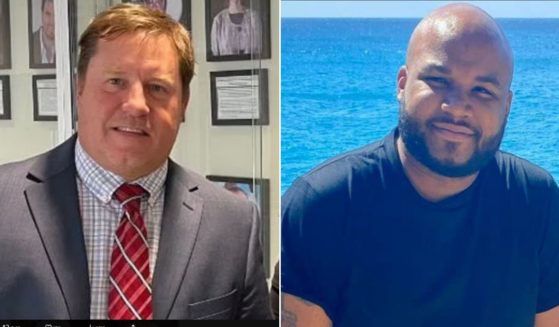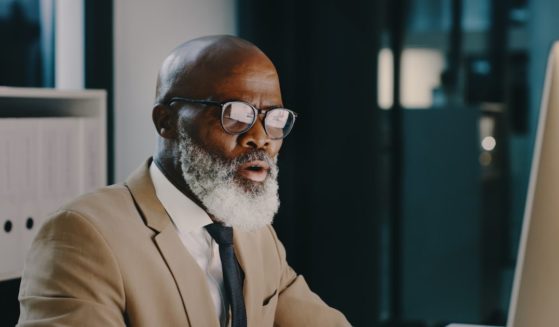Watch: Star QB Aaron Rodgers Tells Joe Rogan What Big Pharma Companies Are Really After
Editor’s Note: Our readers responded strongly to this story when it originally ran; we’re reposting it here in case you missed it.
New York Jets quarterback Aaron Rodgers has proved that when it comes to health and safety, he’d rather be safe than sorry.
In 2021, Rodgers faced widespread criticism after revealing he was unvaccinated against COVID-19 after previously saying he had been “immunized,” according to CBS Sports.
A year later, on the “Joe Rogan Experience” podcast, Rodgers admitted he deliberately gave vague answers about his vaccination status earlier in 2021.
“I’d been ready the entire time for this question and had thought about how I wanted to answer it,” Rodgers told host Joe Rogan.
“And I had come to the conclusion I’m gonna say, ‘I’ve been immunized.’ And if there’s a follow-up, then talk about my process. But [I] thought there’s a possibility that I say, ‘I’m immunized,’ maybe they understand what that means, maybe they don’t,” he said.
After the NFL denied Rodgers a medical exemption from the vaccine, the Packers quarterback said he went through an “immunization process” supervised by a holistic doctor instead of getting vaccinated. He said he did not want to take the Johnson & Johnson vaccine and was allergic to an ingredient used in the Moderna and Pfizer vaccines.
Rodgers also stirred up debate when he jokingly dubbed Kansas City Chiefs tight end Travis Kelce “Mr. Pfizer” over Kelce’s appearance in a COVID-19 vaccine commercial.
Kelce responded by saying the nickname was “pretty good.”
The Jets quarterback then proposed a public debate on vaccine efficacy between himself and Kelce.
He suggested independent presidential candidate and COVID vaccine skeptic Robert Kennedy Jr. would help him argue his stance, while Kelce could be aided by COVID vaccine proponent Dr. Anthony Fauci, former director of the National Institute of Allergy and Infectious Diseases.
On Feb. 7, Rodgers was back on the “Joe Rogan Experience,” and he talked about the vaccine backlash he faced and his views on pharmaceutical companies.
“You either stand for something — stand courageously for what you believe in — or the opposite side of that is either saying nothing or being a coward,” he said. “And I wasn’t willing to do that.”
“I’m going to continue talking about this stuff because it’s important to me,” the quarterback said. “And I don’t want the memories to be lost. I don’t want what I went through to get brushed over.”
He added, “I think it’s an important responsibility to continue to speak up and use my voice to give other people the permission to stand up as well. Because there’s a lot of people that believe a lot of things that I believe in that don’t have the opportunity to do it, don’t have the courage to do it, don’t have the platform to do it in. And I feel like I can speak for some of those people and hold the line for some of those people.”
WARNING: The following videos contain vulgar language that some viewers may find offensive.
“Why these drug companies, Big Pharma, spending so much money on advertisements during the news is not to sell their products — they don’t have a problem with that,” Rodgers said in another part of his Rogan interview. “It’s to control the messaging.
“They’re f***ing controlling the message.”
He opined that if someone were to try to stop pharmaceutical companies from advertising their products on television, the person would be attacked for being “anti-science.”
Rogan pointed out that the U.S. is one of only two countries, along with New Zealand, that allow pharmaceuticals to be marketed directly to the public.
“What RFK wants to do, kind of the dismantling or the reforming, realigning of the CDC and the NIH and some of these alphabet companies who’ve been lying and misleading the public for so long, you know, he would get absolutely slaughtered by the media,” Rodgers said, referring to Kennedy’s comments about the Centers for Disease Control and Prevention and the National Institutes of Health.
“Why? It’s not because they actually believe that,” he said. “But because who’s paying them?
“It’s those companies, so they can control the message.”
Aaron Rodgers is wide awake:
“Why are these drug companies and Big Pharma spending so much money on advertisements during the news? It’s not to sell their products, it’s to control the messaging.” pic.twitter.com/SUeGhv3Ap2
— Citizen Free Press (@CitizenFreePres) February 7, 2024
Rodgers is right on the money about pharmaceutical advertising — and even the scientific community knows it.
An analysis published Feb. 7 by the Johns Hopkins Bloomberg School of Public Health studied how much money drug companies spend on advertising directly to consumers.
The researchers looked at more than 130 top-selling prescription drugs in the United States.
The study found that drugs with lower effectiveness ratings spent a higher percentage of their advertising budget on consumer ads.
In other words, drug makers spend more to advertise to consumers when their drugs aren’t that effective or don’t have much advantage over other options.
This matters because consumer drug ads can influence what medications patients ask their doctors for.
Patients may request expensive or inappropriate drugs just because they’ve seen them advertised, even over their doctor’s advice.
“The findings suggest that shifting promotional dollars to direct-to-consumer advertising potentially reflects a strategy to drive patient demand for drugs that clinicians would be less likely to prescribe,” Michael DiStefano, the lead author of the study, said in a statement.
“When a consumer sees these advertisements on TV or social media, they should really question if it’s the best drug for them and have a conversation with their provider,” DiStefano said.
As Rodgers rightly pointed out, the United States is nearly alone in allowing medications with serious side effects to be advertised as if they are candy.
The Jets quarterback is no stranger to controversy, and he is risking further backlash by confronting the influence of deep-pocketed drug manufacturers.
We need more conscientious public figures to follow his lead and leverage their platforms to question the status quo.
Truth and Accuracy
We are committed to truth and accuracy in all of our journalism. Read our editorial standards.












